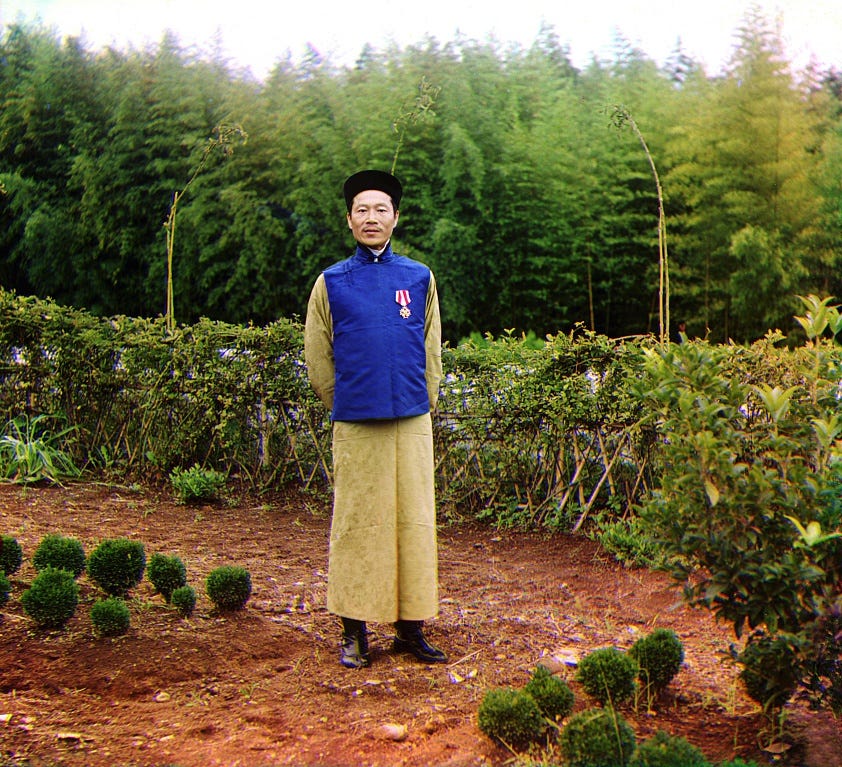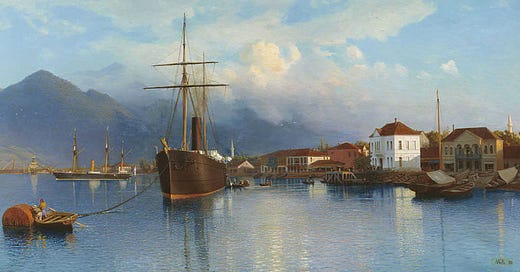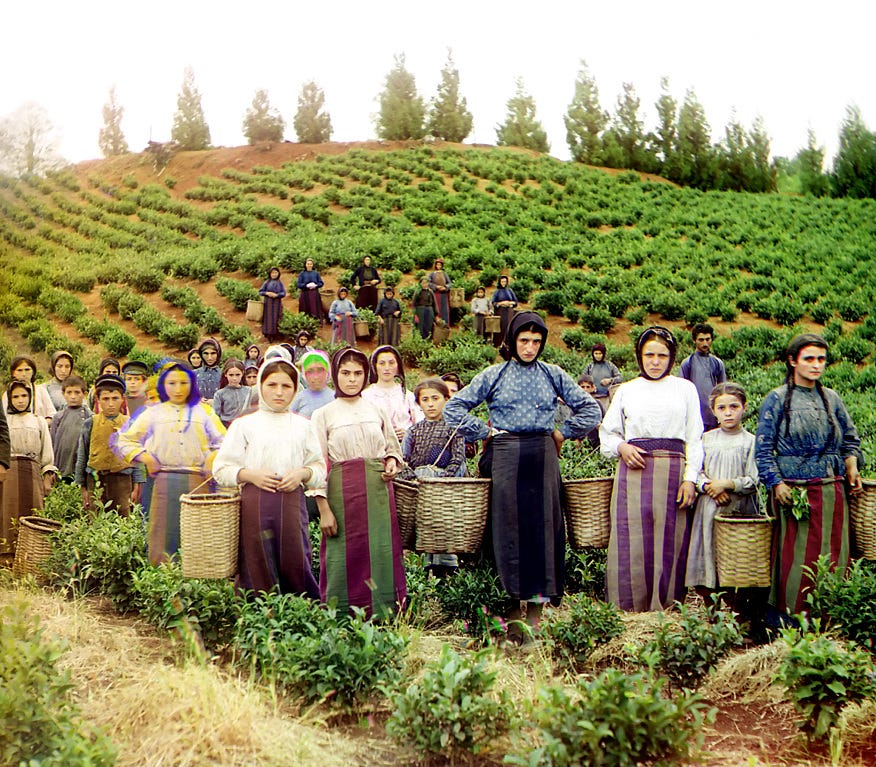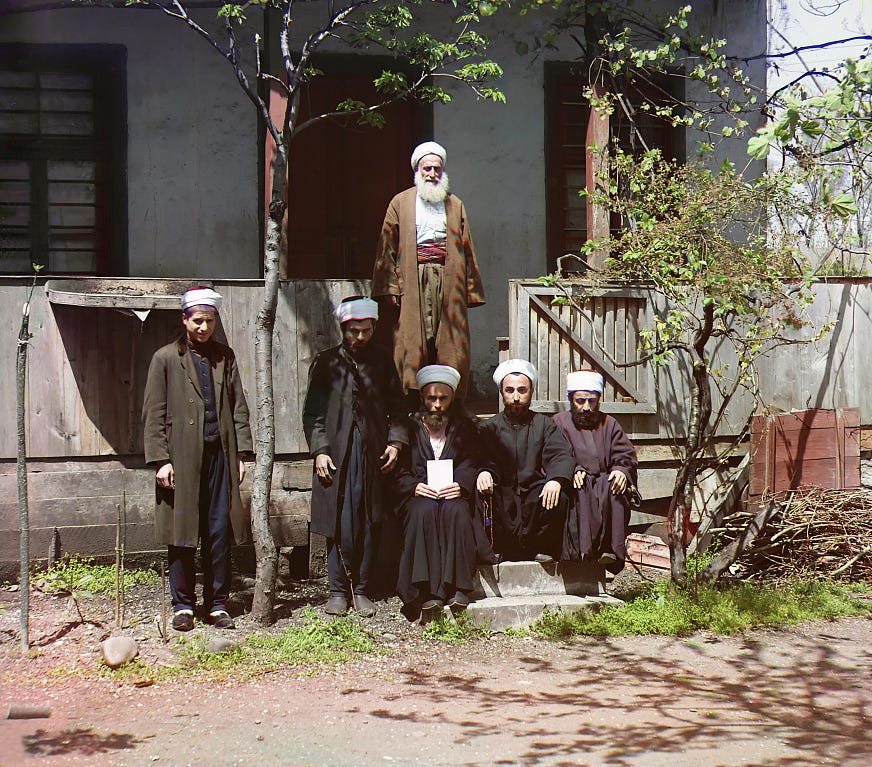Eurasia note #72 - Tourist Batumi's Lessons For Today
A idiosyncratic oil port reveals the highs and lows of industrial planning
A meander and discourse into the oil heartland of the Nobel-Rothschilds and some insights into the forces besieging Russia, Ukraine and the region today.
(1,600 words or about eight minutes of your company).
Tbilisi, Mar 3, 2023
Batumi on Georgia’s Black Sea coast is something of an unlikely tourist destination. It is an industrial port dedicated to the loading and export of oil, with a rather lovely boulevard of palm trees and a wave-battered, eroding beach.
In a city founded on oil, the Technological Museum of Batumi should be a well of information. It is housed in an old Nobel brothers’ building, containing their furniture, a model of an early tanker sailboat, many helpful maps and photographs, historic equipment like a canning machine for kerosene, but it is only a basic introduction.
The first oil pipeline in the Russian empire had been built in 1878, from the Nobel Brothers’ fields in Balakhani to Baku. It was followed by more, and five years later by a proposal to line the route of newly-opened South Caucasus railway.
In 1907, when the city was still called Batum, a kerosene pipeline from the modern day Azeri city of Baku was opened. It was the world’s longest pipeline as oil had until then been moved in barrels and later rail wagons. In 1925 it was refitted as a crude oil pipeline. A second pipeline was added in 1928. In this century the route has been overshadowed by the Caspian Pipeline Consortium to Novorossiysk in Krasnodar krai, Russia.
Today Kazakhstan’s national oil company KazMunayGas owns the Batumi Oil Terminal, and has been increasing exports via Batumi, through rail cars and via the Baku-Tbilisi-Ceyhan pipeline. [1]
Chevron, which has a 50 per cent stake in the operator of Kazakhstan’s Tengiz oilfield, Tengizchevroil (TCO), has also made increasing use of Batumi while CPC has reduced output for maintenance during the past year.
Oiler-bankers
Oil was extracted and processed in in Georgia’s Kakheti region from the mid-19th century by, among others, the Siemens brothers.
Then the focus switched to the oil fields of Azerbaijan. The Tsar Alexander II had opened up the Russian empire to oil exploration shortly before his assassination in 1881.
By the turn of the 20th century the big players in oil were the Nobel brothers, Ludvig and Robert — brothers of the dynamite producer Alfred, who salved his reputation with the peace prize — dominating the industry until they faced competition from the French branch of the Rothschild family. We've written about this period in other articles.
See NAZI Bargain And The Post-War Order (Oct, 2021)
Eurasia note #11- Kazakh Protests (Jan, 2022)
Crisis Update - Germany Resumes European Lead (Mar, 2022)
Alphonse de Rothschild recognized that the key to profit from kerosene and oil was distribution. There wasn't much point pumping more of it out of the ground if you could not get it to market at a good margin. The Rothschilds’ “Caspian and Black Sea Oil Company” was established in 1889 and pioneered the transport of oil by tanker in place of barrels and metal bidons.
John D Rockefeller, who was also attracted to the Russian imperial oilfields, would learn from de Rothschild and would later make his fortune primarily by cornering the transportation of oil.
Prominent Georgians in the industry included Alexander Mantashev whose steel factory in Batumi provided the sheet metal for oil cisterns. Konstantine Zubalashvili produced oil in Bibieibat, and Akaki Khoshtaria who won concessions from the Shah in Persia in 1907 some 35 years after the banker Paul Julius Reuter, who also founded the news agency, secured the controversial Reuter concession that was cancelled after public protest. He was compensated with a 40 year concession to operate the central bank.
This small diversion into Iran and banking is relevant since it illustrates how banking interests had great influence in the development of oil and mineral resources, and in shaping the future of continents.
Banking interests would be involved in destabilising Russia. Stalin worked at the Rothschilds’ oil plant in Baku, ordered the assassination of a manager, was paid off to stop strikes and was later rehired and given money by the family according to the historian Simon Montefiori. The Rothschilds began preparing to offload their Russian oil interests before the first revolution in 1905.
The previous year Russia’s share in world oil exports began to drop, from 31 to 9 per cent by 1913, according to Danil Yergin, author of Extraction: World History of the Fight for Oil, Money and Power (1999).
The Rothschilds completed the transfer of their Russia holdings to Royal Dutch Shell in 1912 for cash and a 20 per cent stake in the newly merged company. They were later called the luckiest businessmen alive.
See Eurasia Note #14 - Foreigners Meddle, Kazakhs Complicit? (Jan 2022)
The Nobels had less foresight. The Bolsheviks seized their oil interests. Rockefeller held on to his and the Bolsheviks allowed him to sell during the 1920s.
In 1930 geologist Ivan N. Strizho, having studied the American refining system, invited Fred Chase Koch from the Kansas city of Wichita. Two refineries of the Jenkins-Systems known as Winkler-Koch stills were installed in Batumi to refine heavy oil into petroleum. By the next year it was working at full capacity.
Koch was one of the smaller players in the United States and, though his distillation system was reportedly more efficient, he was hounded by others for patent infringement. Some say he wound up in Stalin's Soviet Union because the USSR did not recognize intellectual property rights.
Either way, Koch made a fortune, forming the basis of one of America's largest privately-owned companies. [2]
A friend points out that the oil business of the 1920s in this region provides the backdrop to Irene Nemerovski's novel David Goulder, published in 1929.
Batumi is not just about oil. The Technological Museum has a section on the repeated efforts to grow tea commercially, which only succeeded with the arrival from China of the agricultural expert Lao Jen-Jao. Tea adapted well to the subtropical climate but cool nights slowed its growth. This contributed to a more delicate taste.
If it should be necessary to point out that technology transfer with China has worked in both directions for thousands of years — do you ever use paper? — this early colour photograph is evidence.

The pioneer of colour photography Sergey Prokudin-Gorsky, born in Vladimir oblast, captured Lao and many more characters of the turn of the 20th century. [3]
Soviet mass production would put an end to the unique qualities of Chakva tea which entrepreneurs are only now trying to revive.
Something similar happened in nearby Crimea where the Soviets replaced high quality wine production by uprooting native vines and replacing them with Italy’s high-yielding Trebbiano to make the famous fizzy and characterless Sovetskoye Shampanskoye (Сове́тское шампа́нское, 'Soviet Champagne'). George Orwell’s Victory Gin triumphed. [4]
Soviet authorities, reflected in the novels of Yevgeny Zamyati’s We (1920) and Aldous Huxley’s Brave New World (1931) acknowledged Fordism and Taylorism as the cutting edge of mass production but they did not realise such innovative systems fail once they are driven not by demand but by the stroke of the bureaucratic pen.
We witness a new push for centralized control. The recent past contains many lessons as to where it leads. Ignorance is no excuse.
Batumi, like Georgia, has seen it all.
Just 10 kilometers from Batumi is one of the most complete Roman forts you will find anywhere. The fortress of Gonio dates at least from the bronze age and later the Greeks brought their wine techology to the region but it came into its own with the Romans as part of a system or regional control, developed by the Byzantines and later the Ottomans.
The Ottoman heritage is still present archaeologically though not as prominent as it was a century ago when Prokudin-Gorsky photographed the local mullahs thought to be on the territory of Azizia mosque.
Nothing that history could bequeath the city has done the damage of its hydro-electric plants upstream of the two main rivers.
The permanently snow-capped mountains have for millennial flooded the rivers, carrying sediment into the sea, replenishing what is a natural deep-water port, and thus subject to erosion. However, numerous hydro-electric dams have slowed the rivers’ torrent to a trickle. The beach is no longer fed with sand and is washing away.
Dutch experts have been commisioned to examine the problem: the shore’s sharp fall-off means there is no chance of building an underwater sea wall, let alone the groynes such as extend perpendicular into the sea on English seafronts.
Truckloads of pebbles are dumped on the Black Sea beaches, smothering the fine black sand from which it gets its name. Yet no sooner are they dumped than the tide scrapes them into the trench that lines the deep Black Sea harbour.
A friend with experience with the European Bank for Reconstruction and Development tells me far to much money has been sunk into hydro-electric projects to reverse them — despite the toll of unexpected consequences.
Batumi is fun... it is acquiring the look of Doha or Dubai with the modern seafront architecture, but if you go up or down the coast it is much smaller, the sea is cleaner and less rough. It has a world class botanical garden as well, established in the 1880s (opened in 1912) by the Russian botanist Andrey Krasnov.
This will be the subject of a separate newsletter.
See also:
Insight — Europe, Gas And The Endgame: Geopolitics is nothing if not about pipelines, bankers and parallels with 1917 (Sep, 2022)
[1] Reuters, Feb 3, 2023 — Kazakhstan increases oil exports bypassing Russia in 2022
[2] Georgian Journal, 2017 — Who were the first Georgian oil producers – Prominent figures of 19th century
[3] Blog of the project "Heritage of S. M. Prokudin-Gorsky" (www.prokudin-gorsky.org)
[4] Renegade Tea Estate — Why did the Georgian tea industry collapse?







In a calmer, saner world I would like to live on the Black Sea region. The Caucasus truly is the centre of our history.